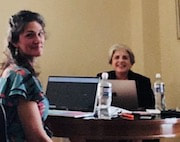Powhatan Energy Fund filed for bankruptcy last week. It has assets of around $52K, and FERC's claim against the limited liability company is around $26M.
The U.S. District Court for the Eastern District of Virginia issued a stay yesterday. The relentless prosecution of FERC against Powhatan has finally been stopped. The game is over, with FERC still holding a mitt of cards. Time to fold.
"We didn't file bankruptcy sooner as we still wanted to fight the case, and prove our innocence. As a matter of fact, we were exploring options for additional funding for the company and pro bono litigation services. But, when the rubber hit the road, we couldn't make it work. The best case scenario was that we'd win with a damning opinion from the court. So what? I'd never receive any consideration/reimbursement, and FERC would ignore the precedent in the future enforcement efforts anyway," said Gates.
FERC isn't much of a gambler, it's more bull(y) in a china shop when it comes to prosecution. Now would be a good time for FERC to step back and reassess whether its policies and practices are really in the best interests of ratepayers; ratepayers are getting bupkis out of all this.
Gates said,
"It's a negative feedback loop -- this type of outcome just emboldens the FERC and encourages them to file more frivolous/bogus lawsuits which will further weigh on the courts. The only way to stop this to have someone go the distance and have someone from the FERC lose their law license, or something, to discourage abusive prosecution. Or structural changes within the courts (loser pays victors legal fees?), and certainly overhauling and perhaps eliminating the administrative state could help. Until then, the government does whatever the government wants to do, and can do so with impunity."
"We got the sense that our judge didn't really want to try the case. She took two years to rule on de novo review several years ago (which could have been a ruling she could have made from the bench) and we felt pressure to make "business decisions". As a citizen of the country, this makes me sad -- you expect to go into the courts and have a judge who wants to dole out justice. But, in reality, I guess the system is overloaded and would simply crash if most actions didn't get settled. I heard that COVID exacerbated the problems -- apparently, the judges are up to their eyeballs in work and are just overwhelmed. So, the courts are really set-up to at least encourage, if not directly push, people to settle," said Gates.
FERC needs to do a postmortem to figure out where they failed. And Kevin Gates no longer believes in justice. As Kenny says... There'll be time enough for countin' when the dealin's done.








 RSS Feed
RSS Feed